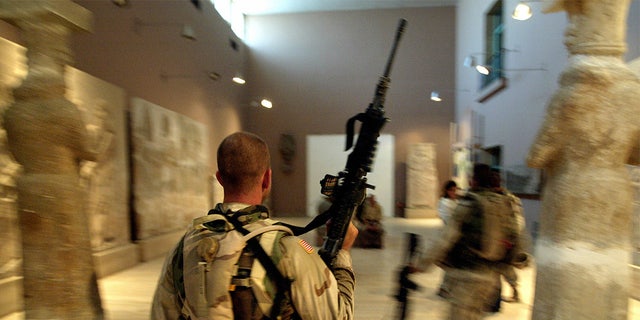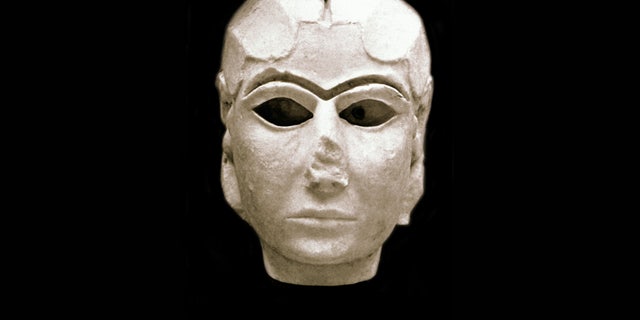US announces return of Iraqi artifacts taken from museum during 2003 invasion
On Wednesday, the Manhattan District Attorney’s Office announced that U.S. investigators would return seven Mesopotamian and Neo-Babylonian seals to Iraq. The seals are a small part of the 15,000 artifacts taken from the Iraq Museum in the aftermath of the 2003 invasion of that country.
In March 2021, one of the seals was listed for sale in an online auction, leading the DA’s office to begin an investigation into the object’s origin and provenance. The consignor of the stamp was soon revealed to be in possession of six additional seals that were purchased shortly after the looting of the Iraq Museum. The seals lacked any documentation that would show they had entered the art market prior to 2003.
Instead, it was determined that the pieces were smuggled into the U.S., where they were purchased through various galleries and online auctions by a private collector between 2004-2009.
The seven objects consist of three stamp seals and four cylinder seals, dating to between the Mesopotamian (2700-2500 B.C.E.) and the Neo-Babylonian (612-539 B.C.E.) periods. The seals would have been used to make impressions on wet clay, with the cylinder seals being rolled onto the two-dimensional surface.
USS FALLUJAH: NAVY TO NAME FUTURE ASSAULT SHIP AFTER ICONIC IRAQ WAR BATTLES
The objects are carved with images of gods, human figures, animals, and other scenes of worship. Each unique seal served as a personal signature to guarantee authenticity of either an individual or a business.
Douglas Cohen, a spokesperson for the DA’s office, told The Art Newspaper that the tip came from an informant who had read Thieves of Baghdad (2005), a book by assistant district attorney Matthew Bogdanos about his experience trailing stolen antiquities.
Immigration and Customs Enforcement’s Homeland Security Investigations (HSI) partnered with the Manhattan DA’s office to return the seals.
“These items were looted by thieves taking advantage of the confusion of war to turn a profit with total disregard to their cultural value,” said Ivan J. Arvelo, Special Agent in Charge of HSI in New York. “These artifacts…were a critical part of everyday life in the ancient world. Now, they will return to their rightful home.”
At the time of the invasion, the plundering of the Iraq Museum’s collection became the subject of debate on Washington’s ability to maintain order in Iraq as Saddam Hussein’s police and military unraveled.
U.S. troops, the sole power in the city at the time, were intensely criticized for not protecting the museum’s treasures and other cultural institutions like the national library and the Saddam Art Center, a museum of modern Iraqi art.
Others claimed the U.S. troops did not have a mandate to act from Washington.
Asked to comment on the looting, then-Defense Secretary Donald H. Rumsfeld famously said: “Stuff happens … and it’s untidy and freedom’s untidy, and free people are free to make mistakes and commit crimes and do bad things.”

UK GOVERNMENT RULES OUT LAW CHANGE FOR RETURN OF PARTHENON MARBLES TO GREECE AFTER ‘SECRET’ MEETINGS
Since 2015, when the Museum reopened to the public, the debate has faded into the background and Iraqi officials have sought to move forward.
A major moment in Iraqi repatriation efforts came in August 2021, when 17,000 artifacts from across Iraq were returned, including ones held by the family that owns the Hobby Lobby craft store chain, and by Cornell University.
Dr. Salwan Sinjari, Iraqi Chargé d’Affairs to the United States, lauded the results of the recent investigation.
“I’m grateful for the work by the Manhattan District Attorney’s Office for its efforts to repatriate these precious, historic antiquities to Iraq,” said Sinjari. “These pieces belong to Iraq—and belong in Iraq—and now they will help the Iraqi people better understand and appreciate our own history and culture with this connection to the past. This is another example of the longstanding cooperation, friendship, and partnership between Iraq and United States.”

While some treasures of the museum’s collection like the “Sumerian Mona Lisa,” a 5,000 year-old mask, have been returned, thousands remain to be recovered.
The Associated Press contributed to this report.
Read the full article Here


